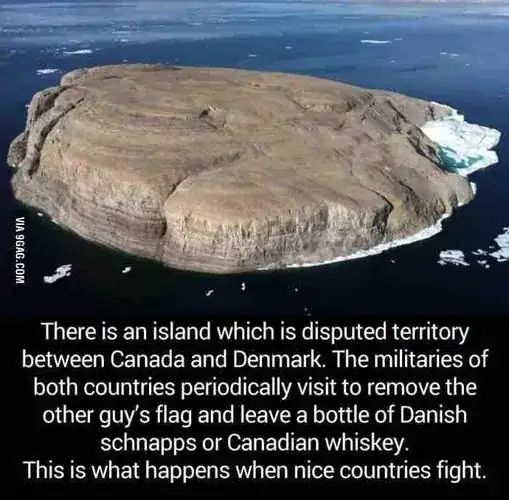Yes, yes, and maybe. The island in question is Hans Island and is disputed territory between Canada and Denmark due to some historical quirks,
According to World Atlas, Hans Island is located in the middle of the
22-mile wide Nares Strait, which separates Greenland, an autonomous
territory of Denmark, from Canada. Due to international law, all
countries have the right to claim territory within 12 miles of their
shore.
As such, Hans Island is technically located in both Danish and
Canadian waters. World Atlas notes that the island was decided to be
Danish territory by the Permanent Court of International Justice of
the League of Nations in 1933.
However, as the League of Nations fell apart in the 1930s and was then
replaced by the United Nations, the ruling on the status of Hans
Island carries little to no weight.
It is true that the militaries of the respective claimants visit the island and both leave their national flag and schnapps or whiskey it is unclear if these are meant as gifts or as territorial markers.
In 1984, Canadian troops made a fateful voyage to Hans Island. In
addition to planting Canada's flag in the rock, they also left behind
a bottle of Canadian whisky. Just one week later, a Danish official
visited the island, replacing Canada's flag with Denmark's and
replacing the whisky with a bottle of Danish brandy. He also upped the
ante a bit, leaving a note that wryly welcomed visitors to Denmark.
"[W]hen Danish military go there, they leave a bottle of schnapps,"
Danish diplomat Peter Taksøe-Jensen tells WorldAtlas. "And when
Canadian military forces come there, they leave a bottle of Canadian
Club and a sign saying 'Welcome to Canada.'"
